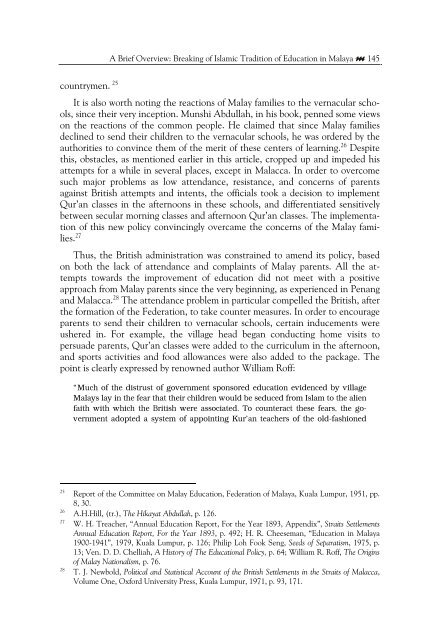İçindekiler - İlahiyat Fakültesi - Marmara Üniversitesi
İçindekiler - İlahiyat Fakültesi - Marmara Üniversitesi
İçindekiler - İlahiyat Fakültesi - Marmara Üniversitesi
Create successful ePaper yourself
Turn your PDF publications into a flip-book with our unique Google optimized e-Paper software.
countrymen. 25<br />
A Brief Overview: Breaking of Islamic Tradition of Education in Malaya 145<br />
It is also worth noting the reactions of Malay families to the vernacular schools,<br />
since their very inception. Munshi Abdullah, in his book, penned some views<br />
on the reactions of the common people. He claimed that since Malay families<br />
declined to send their children to the vernacular schools, he was ordered by the<br />
authorities to convince them of the merit of these centers of learning. 26 Despite<br />
this, obstacles, as mentioned earlier in this article, cropped up and impeded his<br />
attempts for a while in several places, except in Malacca. In order to overcome<br />
such major problems as low attendance, resistance, and concerns of parents<br />
against British attempts and intents, the officials took a decision to implement<br />
Qur’an classes in the afternoons in these schools, and differentiated sensitively<br />
between secular morning classes and afternoon Qur’an classes. The implementation<br />
of this new policy convincingly overcame the concerns of the Malay families.<br />
27<br />
Thus, the British administration was constrained to amend its policy, based<br />
on both the lack of attendance and complaints of Malay parents. All the attempts<br />
towards the improvement of education did not meet with a positive<br />
approach from Malay parents since the very beginning, as experienced in Penang<br />
and Malacca. 28 The attendance problem in particular compelled the British, after<br />
the formation of the Federation, to take counter measures. In order to encourage<br />
parents to send their children to vernacular schools, certain inducements were<br />
ushered in. For example, the village head began conducting home visits to<br />
persuade parents, Qur’an classes were added to the curriculum in the afternoon,<br />
and sports activities and food allowances were also added to the package. The<br />
point is clearly expressed by renowned author William Roff:<br />
“Much of the distrust of government sponsored education evidenced by village<br />
Malays lay in the fear that their children would be seduced from Islam to the alien<br />
faith with which the British were associated. To counteract these fears, the government<br />
adopted a system of appointing Kur’an teachers of the old-fashioned<br />
25<br />
Report of the Committee on Malay Education, Federation of Malaya, Kuala Lumpur, 1951, pp.<br />
8, 30.<br />
26<br />
A.H.Hill, (tr.), The Hikayat Abdullah, p. 126.<br />
27<br />
W. H. Treacher, “Annual Education Report, For the Year 1893, Appendix”, Straits Settlements<br />
Annual Education Report, For the Year 1893, p. 492; H. R. Cheeseman, “Education in Malaya<br />
1900-1941”, 1979, Kuala Lumpur, p. 126; Philip Loh Fook Seng, Seeds of Separatism, 1975, p.<br />
13; Ven. D. D. Chelliah, A History of The Educational Policy, p. 64; William R. Roff, The Origins<br />
of Malay Nationalism, p. 76.<br />
28<br />
T. J. Newbold, Political and Statistical Account of the British Settlements in the Straits of Malacca,<br />
Volume One, Oxford University Press, Kuala Lumpur, 1971, p. 93, 171.



